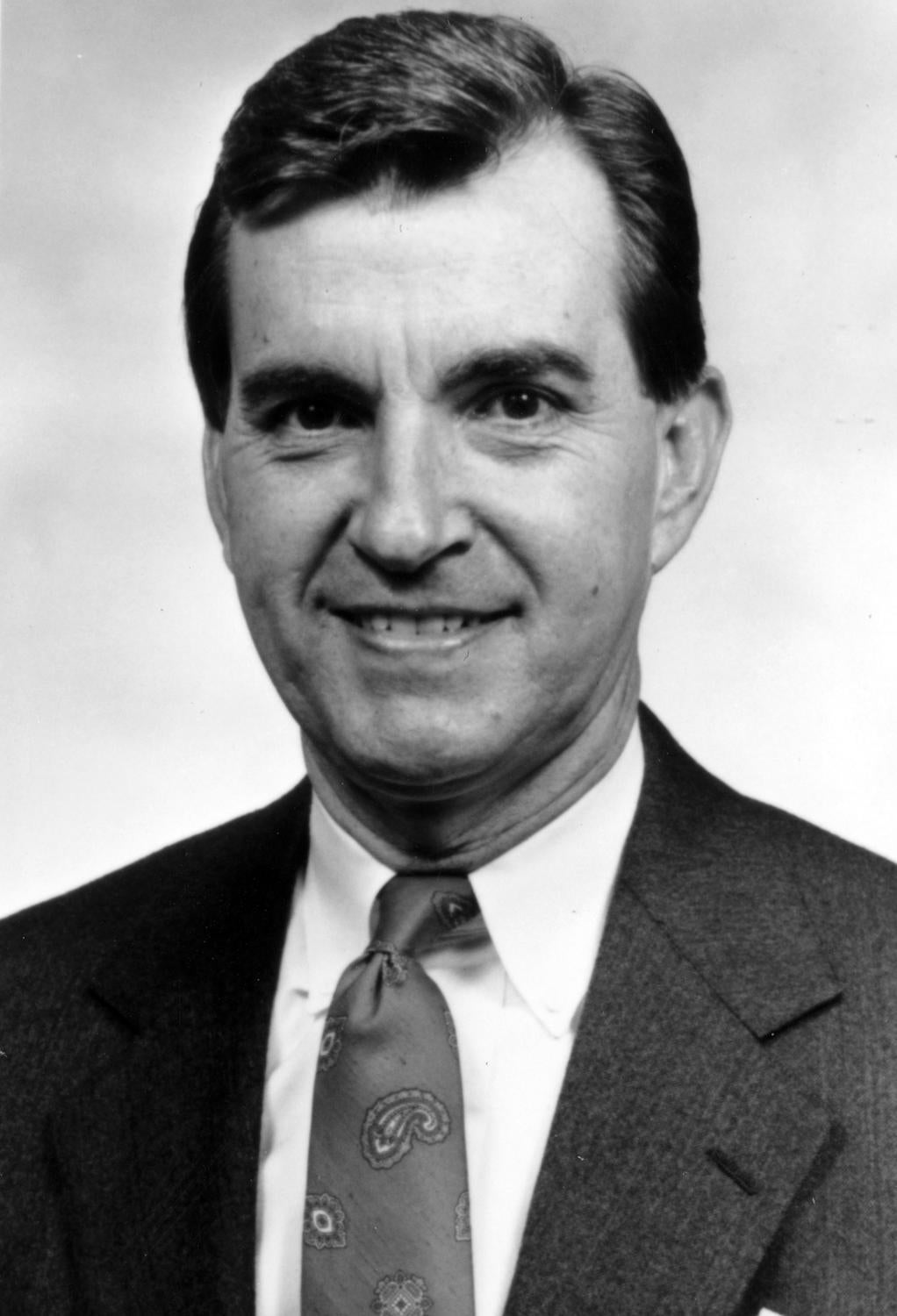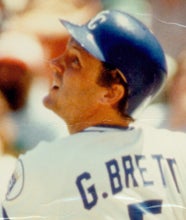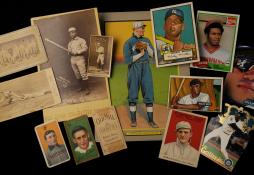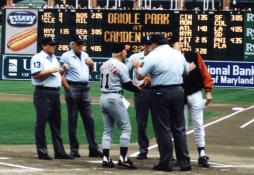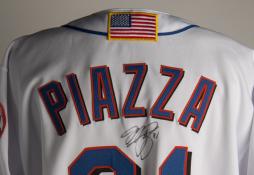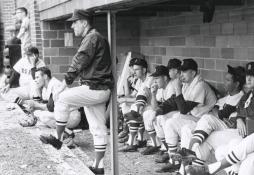- Home
- Our Stories
- #CardCorner: 1978 Topps Dave Chalk
#CardCorner: 1978 Topps Dave Chalk
An appearance in a single big league baseball game gives a person a lifetime of limited pop culture status, and a player like Dave Chalk, who appeared in games over nine seasons from 1973-81, will always be remembered for as long as the game is played.
But Chalk – by virtue of his connection to one of the most popular television shows in history – has a bit more fame than the average MLB all-star.
On Feb. 27, 1978 – right around the time the 1978 Topps set debuted with a card featuring Chalk relaxing in the dugout on card No. 178 – the penultimate sixth-season episode of M*A*S*H premiered on CBS Television. The screenplay was written by Ken Levine and David Isaacs, along with veteran M*A*S*H story contributor Ronny Graham, and was entitled “Dr. Winchester and Mr. Hyde” – telling the story of the titular character’s battle with amphetamines.
Levine, who would be nominated for multiple Emmy Awards during his career and took home a win for his work on the sitcom Cheers, was a huge baseball fan and eventually broadcasted games for several teams. In “Dr. Winchester and Mr. Hyde”, he blended his two passions by naming four Marines in that episode after the 1977 California Angels infield: Solaita (first baseman Tony Solaita), Remy (second baseman Jerry Remy), Grich (shortstop Bobby Grich) and Chalk (the Angels third baseman).
That episode finished fourth in the Nielsen Ratings that week and has been re-run hundreds of thousands of times on channels throughout the world, with Chalk’s name featured each time on the closing credits. For Chalk, it was an extra dose of fame in a career that had already featured two All-Star Game selections.

Born Aug. 30, 1950, in Del Rio, Texas, Chalk starred at Justin F. Kimball High School in Dallas. He enrolled at the University of Texas after graduation and saw action immediately as a freshman in 1969, helping the Longhorns advance to the College World Series. Chalk and the Longhorns would also play in the College World Series in 1970 and 1972, with Chalk earning three All-American team berths as a third baseman and hitting better than .400 as a junior while finishing with better than 200 career hits.
On June 6, 1972, the Angels selected Chalk with the 10th overall pick in the MLB Draft.
“This is the dream of everybody’s career,” Chalk told the Associated Press. “It’s been my ambition to play Major League Baseball since Little League.”
Many thought Chalk might be a Top 5 pick, and Chalk himself expressed hopes that he might go directly to the big leagues. But the Angels sent Chalk to Double-A Shreveport of the Texas League, where he hit .253 in 76 games – almost all of which came at third base.

In 1973, the Angels moved Chalk to shortstop, where he hit .256 in 140 combined games with Double-A El Paso and Triple-A Salt Lake City. On Sept. 4, Chalk debuted with the Angels and spent most of the next month as the team’s starting shortstop, batting .232 over 24 games.
In the spring of 1974, Chalk beat out Rudy Meoli and Bobby Valentine to win the Opening Day nod at shortstop. Chalk with pair with second baseman Denny Doyle, acquired after the 1973 season from the Phillies, in what Angels manager Bobby Winkles hoped would become the game’s best defensive combo up the middle.

“Doyle called me from his home last winter and wanted to know who the shortstop would be,” Winkles told the San Bernadino Sun-Telegram early in the 1974 season. “I told him I thought Chalk would be our shortstop. (Doyle) said he wanted to meet him on the first day of practice. Doyle said he and (Larry) Bowa were the best in the National League last year because they talked things over. So I let them room together in the spring and talk all night if they wanted to.
“I’ve been around this league two years now, and up to now, I haven’t seen any two (turn the double play) as well.”
Winkles didn’t make it to the All-Star break as the young Angels struggled to win any games when Nolan Ryan or Frank Tanana weren’t pitching. Dick Williams replaced Winkles and took Chalk and Frank Robinson with him to the All-Star Game (Williams had resigned as Oakland’s manager following the 1973 World Series but was named the ASG manager as soon as he returned to the bench with the Angels) – and Chalk got into the game as a defensive replacement at third base.
Chalk finished the year batting .252 in 133 games but committed an AL-worst 34 errors, including 29 in 99 games at shortstop. In 1975, Williams moved Chalk to third base.
“Sure, I would prefer to play shortstop because it is more of a challenge,” Chalk told the Palm Springs (Calif.) Desert Sun in the spring of 1975. “But I’m just happy to be in the lineup and playing every day.
“(Williams) won’t put it with any mistakes. He has brought a super attitude to this team.”
Chalk was named to his second All-Star Game in 1975, hitting .273 with 24 doubles, 56 RBI and 66 walks in 149 games while finishing second among AL third basemen with a .976 fielding percentage – three points behind Brooks Robinson. But after starting fast in 1976, Chalk went into a prolonged slump after Williams – dissatisfied with the play of shortstop Orlando Ramirez – moved Chalk to short in May.

Chalk finished the season batting .217 in 142 games – 102 of which came at shortstop. Williams, meanwhile, was dismissed in July with the team’s record at 39-57.
Angels owner Gene Autry dipped into the first full class of free agents after the 1976 season and signed Bobby Grich to play shortstop, moving Chalk back to third base. Chalk, meanwhile, signed a three-year deal in the waning days of Spring Training that would pay him a little more than $60,000 per season.
Grich hurt his back a third of the way through the season and only played 52 games that year but new managers Norm Sherry and Dave Garcia (who replaced Sherry midway through the season) kept Chalk at third base. Chalk responded with a campaign that looked very much like his 1975 season, hitting .277 with 27 doubles and 45 RBI in 149 games.
But in 1978, rookie Carney Lansford wowed the Angels’ brass throughout Spring Training – and Garcia named Lansford his starter at third base and moved Chalk into a utility role. He hit .253 in 135 games that season, most of which came at shortstop. Then on the day before the season ended, Chalk injured his knee while fielding a ground ball against the White Sox at Anaheim Stadium. He underwent surgery the next day and missed all of Spring Training in 1979. He had not yet appeared in a game that season when the Angels executed an in-division trade and sent Chalk to Texas on May 4 in exchange for Bert Campaneris, who had asked for a trade following the loss of his starting job.
“We realize Campy could be helpful to California,” Rangers general manager Eddie Robinson told AP. “We also think that an unhappy ballplayer is not a very desirable thing to have around.
“Dave Chalk is a local product, and based on the reports we have, we think we’ll be better off having him.”

But Chalk played in just nine games for the Rangers before he was dealt again – this time to the Athletics along with Mike Heath in a deal for pitcher John Henry Johnson. The A’s were in the midst of a 108-loss season, and Chalk hit .222 over 66 games before becoming a free agent when the campaign ended.
Three teams – San Francisco, Cleveland and Texas – took Chalk in the free agent re-entry draft. None of them engaged in serious negotiations with Chalk.
“I was ready to hang ’em up and see what the real world was like,” Chalk told the Wichita Eagle.
But Royals scouting director John Schuerholz contacted Chalk and said there might be a place for him on the Kansas City roster in 1980.
“We’ll call you…maybe,” Chalk remembered Schuerholz telling him.
When Schuerholz didn’t call, Chalk reached out to the future Hall of Fame executive to see if an opportunity might still exist. Schuerholz offered Chalk a minor league deal with an invitation to Spring Training – and Chalk made the team as a utility infielder.
“This infield is pretty well set,” Chalk said early in the 1980 season. “I know I could start with another club.
“I thought the day would probably come (when he would no longer be a starter). I just didn’t think it would be this soon.”

Chalk played in 61 games off the bench for the Royals in 1980, helping Kansas City win the AL West title for the fourth time in five seasons. But unlike the previous three times, this Royals team defeated the Yankees in the American League Championship Series. Chalk did not play in the ALCS but found his way into one game in the World Series, making his postseason debut in Game 2 against the Phillies when he replaced a hobbled George Brett at third base in the sixth inning. Chalk came to the plate in the seventh inning and drew a walk off Steve Carlton, eventually scoring on a double by Amos Otis in a three-run rally that gave the Royals a 4-2 lead.
But the Phillies eventually won the game 6-4 and the series in six games, and Chalk did not appear in another contest. He is one of only two players in history – along with Lefty O’Doul – to play in one career World Series game, come to the plate once, reach base and score.
Chalk played in 27 games in the strike-shortened 1981 season, hitting .224. He retired with a .252 batting average over nine seasons, amassing 733 hits. But thanks to his last name and a little help from a baseball-loving TV writer, his name appears on screens throughout the world every single day.
“Maybe when I was at the top, I just assumed I’d stay there forever,” Chalk told the Wichita Eagle during the 1980 season. “Maybe it’s more luck to staying at the top of this game than I thought. … No, I can’t believe that. Even now.”
Craig Muder is the director of communications at the National Baseball Hall of Fame and Museum

